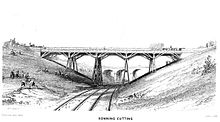Sonning Cutting: Difference between revisions
Those sections are so short as to be almost meaningless. Simplify. |
simplify a section heading |
||
| Line 10: | Line 10: | ||
After the ending of the [[broad gauge]] in 1892 the railway was widened to four tracks. This involved a major rebuilding of the cutting, during which the slope of the sides was reduced. |
After the ending of the [[broad gauge]] in 1892 the railway was widened to four tracks. This involved a major rebuilding of the cutting, during which the slope of the sides was reduced. |
||
== |
== Accident == |
||
[[File:Sonning cutting.jpg|thumb|View of Sonning Cutting in 1846.]] |
[[File:Sonning cutting.jpg|thumb|View of Sonning Cutting in 1846.]] |
||
{{Main|Railway accident at Sonning Cutting}} |
{{Main|Railway accident at Sonning Cutting}} |
||
Revision as of 21:05, 30 March 2021


Sonning Cutting is on the original Great Western Railway built by Isambard Kingdom Brunel.[1] It is to the east of Reading station and to the west of Twyford station near the village of Sonning in Berkshire, England. The railway's originally planned route had been around the north of Sonning Hill past the village. But because of local objections the railway bypassed the village in a cutting, over a mile long and up to sixty feet deep, through the hill, giving a more direct route between Twyford and Reading.[2]
The cutting was hand-dug with no machinery and the spoil removed in wheelbarrows and horse-drawn carts. It took two years to complete and several people were killed in the process. The line was opened on 30 March 1840.
After the ending of the broad gauge in 1892 the railway was widened to four tracks. This involved a major rebuilding of the cutting, during which the slope of the sides was reduced.
Accident

Early on 24 December 1841, a mixed goods and passenger train ran into a landslide in the cutting, caused by earlier persistent heavy rain.[3] Many passengers who were carried in open-topped wagons were thrown out or crushed between the wagons. Eight people died there and seventeen, one of whom died later, were injured. Among the casualties were artisans returning home after working on the new Parliament building. The tragedy stimulated William Ewart Gladstone, while President of the Board of Trade (1843–1845), to introduce legislation to improve safety on the railways.[citation needed]
See also
- Pre-1900 rail accidents in the UK
- List of British rail accidents by death toll, fewer than 10 killed
References
- ^ Building the Great Western Railway Archived 15 October 2010 at the Wayback Machine, Reading History Trail Archived 20 February 2006 at the Wayback Machine, United Kingdom.
- ^ Sonning Cutting, Network Rail, United Kingdom.
- ^ Railway Accidents near Reading Archived 9 May 2006 at the Wayback Machine, Reading History Trail Archived 20 February 2006 at the Wayback Machine, United Kingdom.
